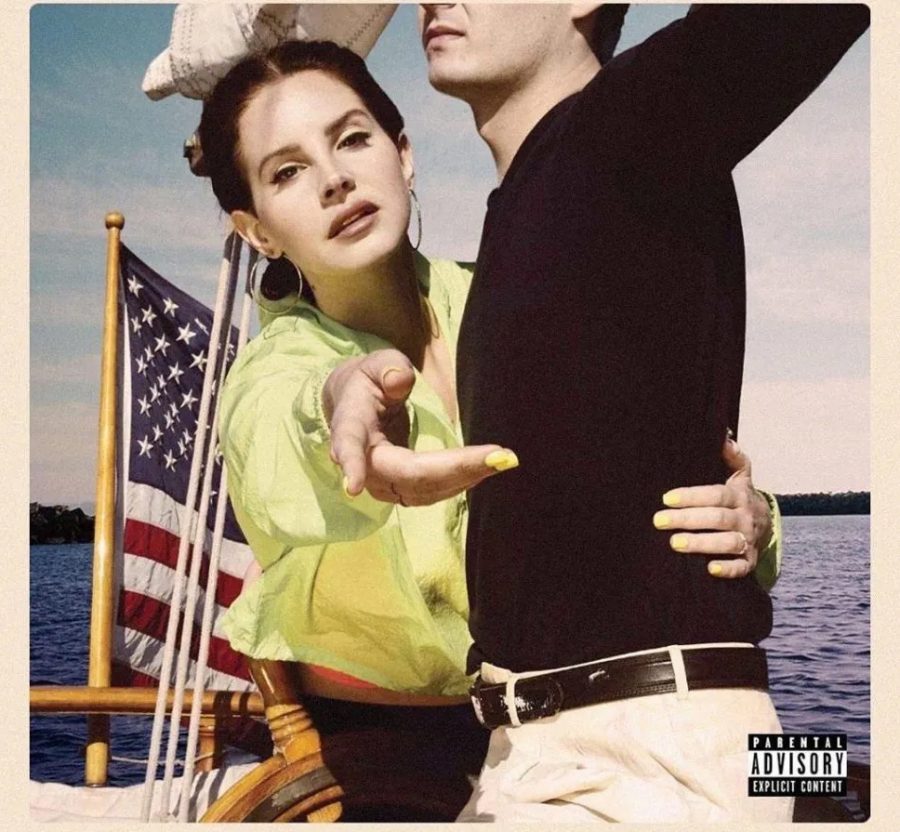A Closer Look – Lana Del Rey’s “Norman F****** Rockwell!”
The iconic album cover.
Norman Rockwell, famous for his painted interpretations of the American Dream, becomes a contradictory symbol in Lana Del Rey’s 2019 album Norman F****** Rockwell! She takes his idealizations of affluence, family, and cultural standards and bends them to fit her own experiences with societal expectations. One of her most common topics, men and misogyny, is combined with the epitome of American motivations like capitalism and the need to be the best of the best. With her melancholic and melodramatic voice, Del Rey criticizes toxic masculinity while hinting at a bigger picture, which is American romanticization.
Three exemplary songs that convey this underlying theme on the album are “Norman F****** Rockwell,” “How to Disappear,” and “Hope is a Dangerous Thing for a Woman Like Me.”
In her first song of the album, named after the album itself, Del Rey tackles the never ending cycle of masculine trauma and how it influences the women who pursue traumatized men. “Your poetry’s bad and you blame the news.” In this excerpt, she brings to light her lover’s loss of love and humanity and how he blames it on the world around him, lifting the guilt off his own shoulders. The news represents the negativity and corruption in the world, and his failing poetry as his loss of his emotional being.
Throughout the song’s lyrics, Del Rey repeats the phrase “man child,” providing a definition of what the song’s subject is: a man who can’t come to terms with the realities of life. “You act like a kid even though you stand six foot two.” Characterized as someone who’s eager to prove himself and be the center of attention, Del Rey includes the fact that despite his narcissistic nature, she lives through it and sees it to the end. “You talk to the walls when the party gets bored of you / But I don’t get bored, I just see it through”
A seemingly overlooked song on the album, “How to Disappear,” continues the narrative of an observational partner, witnessing her significant other go through the conditions of being a man, building himself up and then destroying himself for it to all happen over again. “Cuts on his face ’cause he fought too hard / I know he’s in over his head / But I love that man like nobody can / He moves mountains and pounds them to ground again / I watched the guys getting high as they fight / For the things that they hold dear / To forget the things they fear / This is how to disappear.”
The most significant aspect of misogynistic culture mentioned here is the savior complex that Del Rey describes as a coping mechanism. Then men make themselves out to be a hero, in order to ignore the situations where that isn’t enough. In this process, his grasp on reality slowly releases, disappearing into the mental need to be the ‘ultimate man,’ someone who can hold his own and defend what he loves.
The last song on the album “Hope is a Dangerous Thing for A Woman Like Me” could almost be considered as a reflection of the first, providing an analysis of herself instead of her love interest. In this song, her candor is the spotlight, letting herself become a victim of the male-oriented society that is endorsed by the American Dream. Again, similarly to “Norman F****** Rockwell,” Del Rey portrays herself as a poet, comparing her female hysteria to that of Sylvia Plath’s. “24/7 Sylvia Plath / Writing in blood on the walls,”
A traumatic icon, Plath wrote poetry mainly about her own mental illness and issues within her marriage. Although Plath died tragically by her own hand, her story of feminine rage and depression has been romanticized by mainstream media in the 21st century, transforming her legacy into a solemn and feministic paradigm. A woman driven internally crazy by what it means to be a woman, nothing without a man.
Continuing her need to relate her own encounters with an overarching idea, Del Rey connects her perceived low morals and perception of what culture should be to America. “There’s a new revolution, a loud evolution that I saw / Born of confusion and quiet collusion of which mostly I’ve known / A modern day woman with a weak constitution.”
If you’ve listened to her music as religiously as I have, these notions of men being vessels of emotional blockage and insanity – by definition, doing the same thing over and over expecting a different result – are the usual for the queen of idealism, Lana Del Rey. What makes this album unique is that even though it’s named after an artist that dedicated his work to depicting the American Dream, her interpretation of the American Dream doesn’t include the traditional ideas of power. Her way of understanding the need to be the best, to have it all, is embodied in the relationships she has experienced, the interactions she has witnessed between men and women. The conditions that men are confined to mentally and emotionally because of society is what capitalism is in a conceptual sense to her.










Nia • May 9, 2024 at 3:36 pm
I’m two years late but this is really insightful, bravo!
Ahmed R • Dec 21, 2023 at 1:32 pm
Here’s an excript from The Guardian’s style guide
“Finally, never use asterisks, which are just a cop-out”
I’d like you to consider telling higgins this